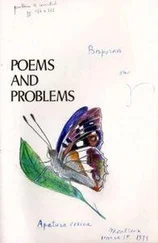Laurence Janifer - Poems are Made by Fools Like Me
Здесь есть возможность читать онлайн «Laurence Janifer - Poems are Made by Fools Like Me» весь текст электронной книги совершенно бесплатно (целиком полную версию без сокращений). В некоторых случаях можно слушать аудио, скачать через торрент в формате fb2 и присутствует краткое содержание. Год выпуска: 1997, Издательство: Dell Magazines, Жанр: Фантастика и фэнтези, на английском языке. Описание произведения, (предисловие) а так же отзывы посетителей доступны на портале библиотеки ЛибКат.
- Название:Poems are Made by Fools Like Me
- Автор:
- Издательство:Dell Magazines
- Жанр:
- Год:1997
- ISBN:нет данных
- Рейтинг книги:4 / 5. Голосов: 1
-
Избранное:Добавить в избранное
- Отзывы:
-
Ваша оценка:
- 80
- 1
- 2
- 3
- 4
- 5
Poems are Made by Fools Like Me: краткое содержание, описание и аннотация
Предлагаем к чтению аннотацию, описание, краткое содержание или предисловие (зависит от того, что написал сам автор книги «Poems are Made by Fools Like Me»). Если вы не нашли необходимую информацию о книге — напишите в комментариях, мы постараемся отыскать её.
Poems are Made by Fools Like Me — читать онлайн бесплатно полную книгу (весь текст) целиком
Ниже представлен текст книги, разбитый по страницам. Система сохранения места последней прочитанной страницы, позволяет с удобством читать онлайн бесплатно книгу «Poems are Made by Fools Like Me», без необходимости каждый раз заново искать на чём Вы остановились. Поставьте закладку, и сможете в любой момент перейти на страницу, на которой закончили чтение.
Интервал:
Закладка:
I would cheerfully have settled for the whole thing being a dream, if that could have made any difference. But if it was a dream, I was stuck living in it, and if I was living in it I had to act, and respond, just as if it were real. And if, of course, it wasn’t a dream… well, then, it had to have some sort of explanation tied to it somewhere.
I couldn’t imagine one—but that, damn it, was my trouble, and not something I could blame on the events.
I sat in a chair in my log cabin, staring at the Glassex windows and deciding to settle for rations for a noon meal—a Survivor does bring such things along for the early going, when Joy of Cooking is only a page or so long—and trying the various pieces for fit: a rocket, a miniature me, a series of pretty good tries at killing the normal-sized me, and a planet with the hell of a lot of trees.
After a minute of thinking I was forgetting something, I brought back the feeling that the noises outside should have changed from late afternoon to fairly early morning. I couldn’t make that piece fit anywhere; but it was not thereby a unique piece. I couldn’t make any of the pieces fit any damned thing at all.
After a while I gave up and ate lunch. It was, as it always is after some crowded action, vaguely surprising that it was lunch time instead of, say, dinner time three days into the future.
Vague surprise was almost a pleasant, reassuring feeling by that time.
After lunch, I went out to pick tan buttons. There wasn’t really anything else to do at the moment; I was going to have to rig something to prevent Thumbelina, as I’d decided to call the rocket, from shooting at me every so often, but that wasn’t going to be too difficult; my supplies had been chosen with large, unfriendly animals in mind, and a rather small, murderous rocket looked like something the supplies would handle.
I wasn’t about to go to war with it. I had a job, I had a year to do it in, and that left very little spare time for fooling around with this off-planetary hazard. I might be curious, and my bump of curiosity, if you’ll forgive the Classical allusion, is more like Olympus Mons than like, say, the small pimple most people seem to have for the function—but I was just going to have to sacrifice my feelings and get on with the job.
So, over that day and part of the next, I sank some warning flashers, rigged to small explosives. I made a nice perimeter around the log cabin, big enough so that it included a fair number of vegetable patches of various sorts (there were some nice-looking tubers, for which I had high hopes, but the first few varieties were major disappointments, wet, ragged and tasteless or worse no matter what I tried)—and distant enough so that the explosives wouldn’t jar me or the log cabin if they did go off.
I had every confidence that they wouldn’t go off; the rocket, when I got a chance to see some of the readouts (and collect some more; the rocket hadn’t come back for them, and, very cautiously and in full field, I recovered most of the dropped valuables myself early next morning) it became clear that the damned thing had detectors to spare, detectors to rent out, detectors to sell to the natives. It was going to spot my perimeter long before it had to deal with it, and it was going to stay nicely out of range.
Until, of course, it figured out its next move. I thought I knew what that had to be, and took the indicated precautions.
Then I went back to Joy of Cooking, chapter on tubers.
I won’t bother you with most of the Joy of Cooking, since you ’re not going to be able to use the Tree volume, and while cookbooks make fascinating bedtime reading for some of us, there are a lot of people who simply aren’t going to care about recipes they’ll never try out. There are even, sad as it seems, some people who just don’t cook.
I did try a lot of tubers, being very fond of tubers myself, but the first four varieties, as I’ve said, wouldn’t come up to real edibility.
And it was a full three days before Thumbelina decided to try again; I was trying a fifth brand of tuber that day, along with some vaguely violet climbing vines that seemed to be filled with a combination of gas and seeds.
In those three days I had done some hard thinking, and I’d managed to get a little closer to the idea of Teeny Knave. If it looks like a duck, walks like a duck, and quacks like a duck, it may yet be a particularly persuasive wind-up toy, and it had begun to dawn on me that the figure I’d seen wasn’t necessarily a living being, in the usual sense of the word. (Are robots—Totums, Robbies, robots of all sorts—living beings? It depends on how you define every word in that question, and what that means is that there is no general agreement on the subject, definitions being as individual as they are. It is always safer, however, to treat any unknown as if it were alive, from your Totum to your toothbrush.)
A robot built to look like me didn’t make a lot more sense than a Teeny Living Sympathetically Magical Me (and made even less sense when I looked at some of the chemical-composition readouts), but the thought was, for reasons I hope are obvious, a lot easier to live with.
Somebody—human or otherwise-had built a robot to kill me with, and had, for reasons I had to insist were important, built it so it looked enough like me for me to recognize. (There might have been a clue in there; the robot didn’t necessarily look like me to an impartial observer, if there is one anywhere in the Universe; what I recognize as me is what I happen to think looks like me in what I happen to see as important details. People you insist look alike aren’t at all likely to agree with you; their list of important details is a different list.)
Well, on the third day, Thumbelina came flying over my log cabin, fully intending to drop in.
To drop in, that is to say, a small bomb.
As I’ve said, I’d taken the indicated precautions—the thing was obviously going to avoid a ground approach, and that left flying or burrowing, and I couldn’t really picture the rocket making its way to me like a nematode—and when it noticed that I’d rigged a blasting cannon (a fairly small one, but a small cannon is a hell of a big weapon) to cover the rooftop, it went sadly away again without anything in the way of a real try.
Smart rocket. Just smart enough so that I started worrying, at once, about its next try. Intelligence is a welcome quality in your friends, in your enemies, it’s only half welcome; there are things you know an intelligent enemy won’t bother to try, which is helpful, but there are things he will bother to try that you haven’t thought of yet— which is not.
All I knew for certain was that it hadn’t given up. It never did seem the type for that, right on through to the end—though in fact I never saw it again.
The end, however, was some while coming. I worked away at Joy of Cooking, getting, over two crowded weeks, a fair listing of basic vegetable dishes, and starting to think about meats and fishes. I had some of the adventures a Survivor gets to expect— being chased by a three-legged horned beast, a fascinating cross between a rhinoceros and a wheelbarrow, for instance, or falling into a rapidly running stream of not-quite-water on a day when I hadn’t been wearing any sort of protective field; the job requires leaving that stuff off whenever possible, naturally, as colonists aren’t going to live in protective fields.
That fall led to several days of charting my temperature and reactions while I stayed firmly in the log cabin; exposure to the water wouldn’t kill me, the drones had promised, but the only way to find out exactly and for certain how very small doses of oddities affect the human body is to let them affect the human body. A slight rise in temperature, and, believe it or not, two days of intermittent hiccups seemed to be about the worst of things, and even that set of reactions would calm down as more and more colonists arrived, and as the planet itself was slowly pushed into closer and closer approximations of the colonists’ needs and wants; small-scale terraforming is what people normally do, everywhere and all the time.
Читать дальшеИнтервал:
Закладка:
Похожие книги на «Poems are Made by Fools Like Me»
Представляем Вашему вниманию похожие книги на «Poems are Made by Fools Like Me» списком для выбора. Мы отобрали схожую по названию и смыслу литературу в надежде предоставить читателям больше вариантов отыскать новые, интересные, ещё непрочитанные произведения.
Обсуждение, отзывы о книге «Poems are Made by Fools Like Me» и просто собственные мнения читателей. Оставьте ваши комментарии, напишите, что Вы думаете о произведении, его смысле или главных героях. Укажите что конкретно понравилось, а что нет, и почему Вы так считаете.












